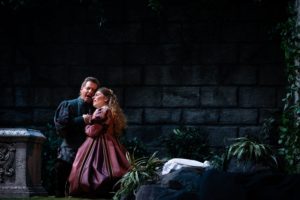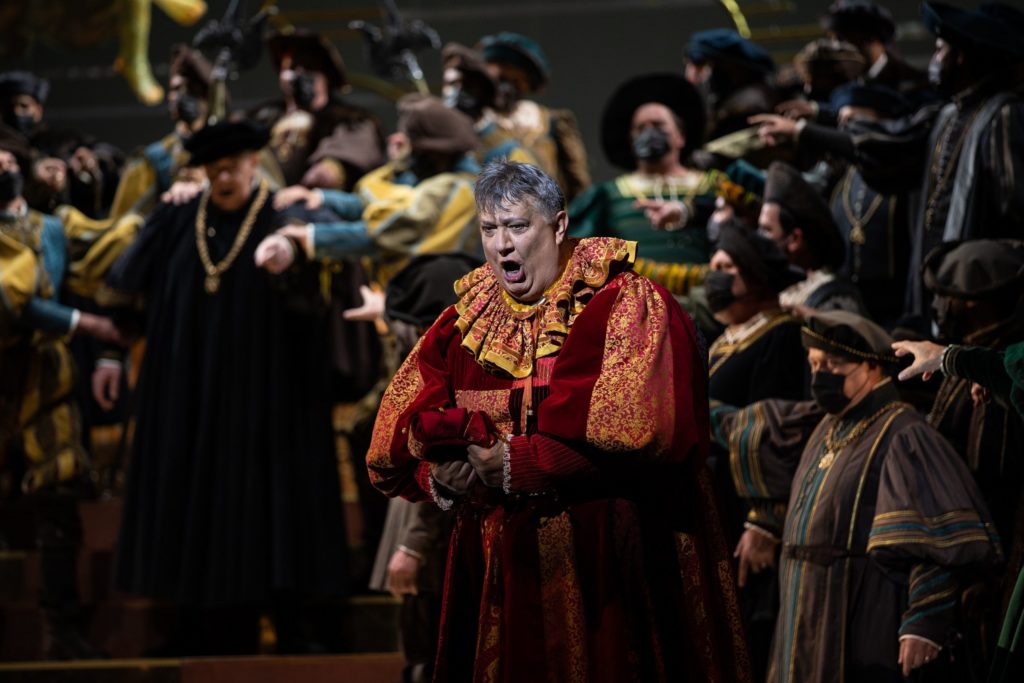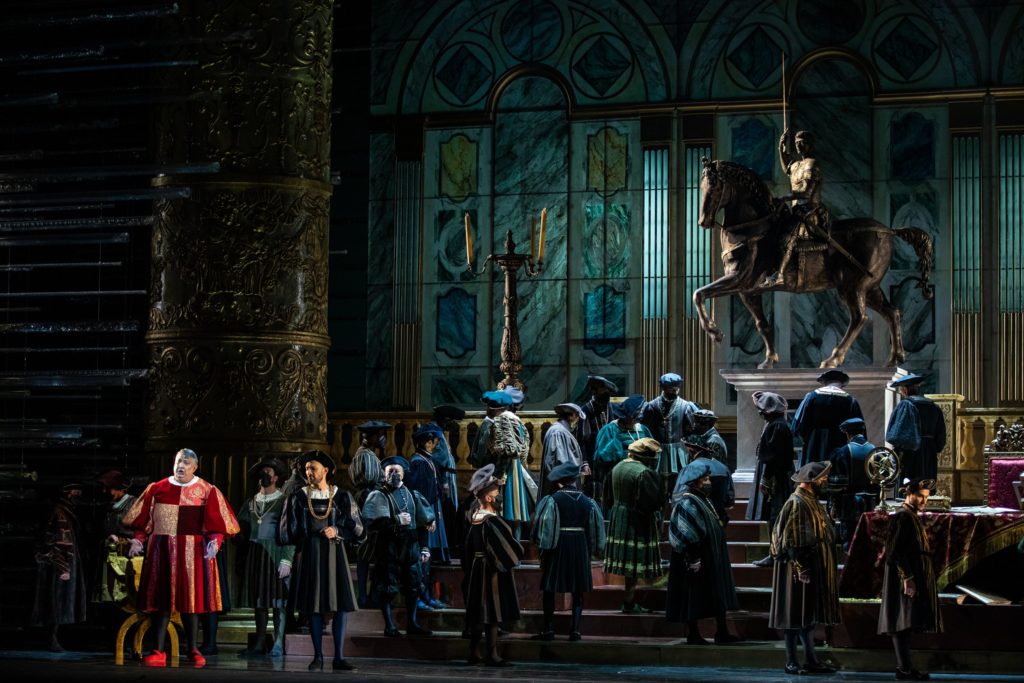
Royal Opera House Muscat 2022 Review: Rigoletto
Giuliana Gianfaldoni & Dmitry Korchak Show Promise in New Zeffirelli Production
By Francisco SalazarOn Jan. 22, the Royal Opera House Muscat presented its final performance of “Rigoletto.”
On this evening, the opening cast returned in Franco Zeffirelli’s final production. The result was a performance filled with excellent singing that sometimes lacked drama and felt disconnected from the glorious production.
A Return to Old Times
Ambrogio Maestri led the cast singing the title role. Maestri is one of those old-fashioned singers who stands and sings with emotion.He was most effective when he did just that, stood in the middle of the stage and sang with his authoritative power. However, when he had to throw a chair or sit down on a seat or the floor, every movement looked planned and overly calculated. He also sometimes lacked a real interaction with his colleagues which made it hard to connect with the circumstances of the story. For example, the relationship with Gilda was a bit distant especially during the duets and the moments where the character is asked to caress his daughter in distress. Vocally he also seemed to never blend with Giuliana Gianfaldoni’s Gilda as he constantly overpowered her with his grand voice. And as a result, it was hard to really believe the tragedy of this character.
Nevertheless, Maestri sang with such vulnerability throughout, especially in his two solo showcases. His “pari siamo” was sung with intimacy and allowed audiences to see great confusion in the character. He displayed a mix of booming sound and pianissimos. He also emoted some of his lines emphasizing the text with precision.
In his aria “Cortigianni vil razza” his voice obtained a grainy and dry sound that was effective for the moment. Throughout the aria, there were a lot of breathy moments that created a more raw approach as well to the dramatic moment. His final “pieta” was exceptional as he crescendoed from a piano to a gritty forte.
I admire the technique in Maestri’s voice as he is able to scoop up to his higher register with ease and he demonstrated booming sound especially in his recitatives. His “Si Vendetta” which while not the most effective dramatically was filled with energy and passion.

Innocent & Beautiful
Giuliana Gianfaldoni performed the role of Gilda with crisp accuracy and a gorgeous tone. From the moment she entered the stage her round leggera voice sounded precise and connected. She used beautiful pianissimo dynamics in her opening duet with Rigoletto, displaying an ingenue in every sense of the word. Her phrases which were clean and sung with beauty were also soft, emphasizing Gilda’s purity. When her father left, the soprano’s expressions were those of guilt. But that soon turned to a lovely dream-like expression as she sang “Signor né principe io lo vorrei.” In her ensuing duet, she was completely transfixed and seduced by the Duke and that was all the more present in her “Caro nome,” which she sang with great care. As she went up to her higher tessitura she floated the notes to create an ethereal sound that slowly dissipated into the auditorium. The coloratura lines were also notably sung with flexibility. This was a Gilda entranced by love at first sight.
In Act two Gianfaldoni held on to the innocence as she sang “Tutte le feste al tempio.” The soprano used her soft sound to express guilt and pain and never went beyond a mezzo forte. That contrasted with Maestri’s more forceful voice. It was quite astonishing to hear the control the soprano had of each dynamic and phrase and to hear how it flowed into the auditorium with ease. The end of the “Si, Vendetta” was the first time that the soprano really unleashed the full volume of her voice as she delivered a powerful “E flat.”
In Act three, Gianfaldoni’s voice blossomed as it gained strength in the quartet and trio. While it never lost the initial precision or delicacy, the voice carried over the ensembles with roundness. “Lassu in ciel” was angelic as Gianfaldoni returned to the floated sustained notes and the pianos. Her final line however was emoted to emphasize Gilda’s death. That was perhaps the least beautiful singing from the soprano but it was also effective.
Gianfaldoni is a rising star whose voice is sure to grow and gain more colors and after this technical display, there is no doubt in my mind that she is one to look out for.
The Duke
As the Duke of Mantua Dmitry Korchak was impressive as he portrayed a frivolous and playful Duke. He sang with ardent passion and a gleaming timbre and it was hard to look away from him when he on stage. His “Quest o quella” was a display of virtuosic singing that mixed a full voice with more suave and sensual phrasing. His duet with the Countess Ceprano was also filled with that same passionate intensity and it was hard not to fall for the Duke’s lies.
In his scene with Gilda, Korchak started the “T’amo! T’amo; ripetilo sì caro accento” with vigor. That led to a seductive “È il sol dell’anima, la vita è amore” which Korchak caressed with a smooth sound that radiated throughout. As he continued the line, his singing grew more passionate and his voice obtained a fuller sound. Once Gianfaldoni joined in the duet, the two were irresistible, singing with connectedness and impeccable sound. It was truly transcendent moment.
In Act two, Korchak’s passion climaxed in “Ella mi fu Rapita,” which he delivered with vigor; one actually got the sense that the shallow character might truly be in love with Gilda. The “Parmi veder le lagrime” was pure passion and Korchak displayed the bel canto line he is well-known for. It was exciting to hear the tone so evenly balanced and how he could go from a forte to a piano without forcing the sound. However, during the cabaletta “Possente amor mi chiama” which is a display of the Duke’s pompous attitude, Korchak struggled to get a pure sound and sometimes sounded a bit strained. Nonetheless, one could commend the flexibility in the line and the display of some impeccable coloratura.
Act three was the weakest for the tenor as he seemed to struggle a bit with “La donna è mobile,” his sound labored at times. His phrasing was still filled with suaveness and the final coloratura cadenza was marvelous and virtuosic. His opening lines of the quartet, “Bella figlia dell’amore” were filled with desire but as he reached the higher tessitura the voice started to obtain an unpleasant timbre that became somewhat nasal and uneasy. Perhaps it was due to all the physicality in the production as Korchak was committed to seducing this Maddalena. But that came at a cost as he continued to increase the volume of his voice and on the repeat of the phrase “consolar,” the voice was a bit unsteady and weary.
This is only the third production that Korchak sings the Duke in and based on his display, he will only get better as the role settles into his lyric voice.

Dynamic Siblings
Yulia Mazurova and Riccardo Zanellato portrayed the roles of Maddalena and Sparafucile to great success. Unlike most productions who seem to show the siblings as the same age, in this cast, there was a clear distinction of age and that created an interesting dynamic. Mazurova gave Maddalena the usual seductive and playful attitude that bit at the text during the quartet. But during the trio, she revealed innocence that resembled that of Gilda. She almost seemed like the Duke’s next victim as she desperately convinced her brother to save Mantua. That was emphasized of course by the singer’s more lyrical mezzo as opposed to the hefty voices that are sometimes used for the role. Meanwhile, Zanellato who had a low and gritty bass that resonated with power, was overbearing and protective. He was violent toward his sister, which created a tense dynamic and a great counterpart to the toxicity of the male characters in this opera. One seemed to pity Maddalena at the end as she was stuck in between two violent men.
In the pit, Jan-Latham-Koenig returned with mixed results. The conductor has a knack for powerful crescendos and fortes which are effective for this dramatic work. There is also precision with the rhythms. However, sometimes there was a bit of sloppiness, especially with the violin solos. During “Caro nome,” the violinist was harsh in his / her phrasing. The sound clashed with Gianfaldoni’s refined voice and distracted from her beautiful phrases. The same could be said of the violins in the Act two duet which once again featured an overly brash sound. However, the cello solo in Rigoletto’s aria was smooth and lush and followed Maestri’s tempi to perfection. Additionally, it blended well with the baritone’s yearning voice. The wind section was also outstanding and well-balanced with Gilda’s line. Many times it sounded as if both the flute solo and soprano were singing a duet.


